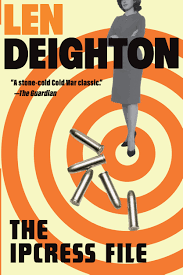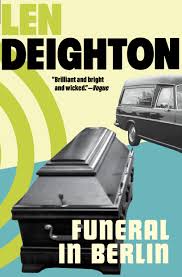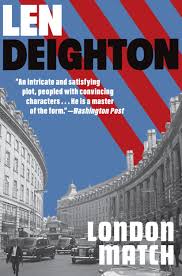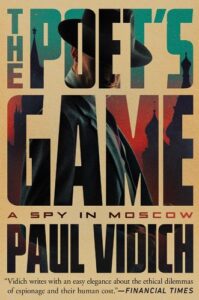Len Deighton published thirty-one novels over the same number of years, making him one of the most – if not the most – productive spy novelist of the twentieth century. Equally remarkable, given the speed of his writing, several of his novels occupy the pantheon of the genre’s best works.
Tim Shipman, chief political commentator at the Sunday Times (UK), and a connoisseur of espionage fiction, has ranked pretty much every author who has written in the genre, and he puts Deighton at #2, behind Le Carré, but ahead of the spy fiction written by Graham Greene, Eric Ambler, Joseph Kanon, and Ian Fleming.
Shipman has written: “Deighton’s importance was two-fold. Firstly, while Ambler moved the genre from superhero secret agents to amateurs, Len made his professional spies rugged working-class men in temperamental opposition to their upper middle-class bosses, which added another dimension…Len’s second great achievement was to take us into the office and explore the kind of dynamics recognizable to anyone working in that environment.” Shipman also credits Deighton’s “wonderfully pointed writing.”
I have chosen six novels to highlight Deighton’s considerable talent, and while some readers might pick a different six, the following novels ably represent his best work. While several were written over forty years ago, they indelibly capture a lost time and make it urgent again. Malcolm Gladwell has written: “Len Deighton’s spy novels are so good, they make me sad the Cold War is over.”

The Ipcress File (1962), Deighton’s debut novel, had an initial print run of 4,000 copies, and his UK publisher had no indication of its impending success. The sardonic narrative voice, and globe-trotting story line, grabbed world-wide attention, and it entered best seller lists in the UK, the US, and France, selling more than 2.5 million books. The plot, as described on the publisher’s website, is simple enough: “A high-ranking scientist has been kidnapped, and a secret British intelligence agency has just recruited Deighton’s iconic unnamed protagonist—later christened Harry Palmer in the film version that stars Michael Caine—to find out why. His search begins in a grimy Soho club and brings him to the other side of the world. When he ends up amongst the Soviets in Beirut, what seemed a straightforward mission turns into something far more sinister.”
The popularity of The Ipcress File came in part because it offered a more realistic image of espionage and intelligence agents. The spy genre at the time was dominated by Ian Fleming’s novels, and the first Bond movie, “Dr. No,” had been released a few months before the novel was released. Deighton’s hero is a bespectacled, slightly overweight junior employee in the War Office who has none of James Bond’s heroic conceits. The protagonist’s ironic voice, and its setting in London’s swinging London social milieu, makes it the “ultimate sixties spy book (more so than A Spy Who Came from the Cold),” says Shipman. The Guardian has called it ‟A stone-cold Cold War classic.”

Funeral in Berlin (1964), Deighton’s third novel, was published in 1964 and quickly became a bestseller. It stayed on the New York Times bestseller list for six months. Its success led to a 1966 film version also starring Michael Caine. This novel, like The Ipcress File, features an unnamed British intelligence agent who is charged with arranging the East Berlin defection of a Soviet scientist being put together with the help of Russia’s Red Army Berlin security chief.
The Red Army security chief is prepared to sell an important Russian scientist to the West – for a price. British intelligence is willing to pay, providing their own top-secret agent, Samson, acts as go-between. But it soon becomes apparent that behind the facade of an elaborate mock funeral lies a game of deadly maneuvers and ruthless tactics. The brutal legacy of Nazi Germany is a shadow hanging over the intricate behavior of cold war espionage.
Funeral in Berlin was the first of many novels that Deighton set in Berlin. He wrote in his introduction to the novel’s 2011 reprinted edition that he became obsessed with Berlin after traveling from Prague to East Berlin in 1962. He was captivated by the city. He wrote: “I studied its history and collected old photographs of its streets, street life, and architecture. I talked to many who had served and many who had suffered under the Third Reich.”
Deighton sidestepped the Cold War in his second book – Horse Under Water – but he returned to the conflict with Funeral in Berlin. He was finding his footing as a writer, and the encouragement of critics helped him understand the sort of books he wanted to write. He said in the 2011 introduction: “I’d never had any childhood ambition to be a writer, so I was not tempted to write ‘serious literature’. My feelings have never changed. This is not because I think that serious literature it too serious. It’s because I think most serious literature is not serious at all.”

3. Bomber
Bomber (1970), Deighton’s masterful portrait of war, follows the progress of an Allied air raid through a period of 24 hours in the summer of 1943, portraying all the participants in a terrifying drama, both in the air and on the ground. Malcolm Gladwell, who wrote the forward to the new Grove Atlantic reissue, said: Bomber is first-class mid-century realism. Deighton sets up his story slowly and carefully. One half of the novel is set at an air force base in England and the other half set in a German town that lies in the path of one of Harri’s bombing runs. We meet people on both sides, described with equal amounts of care and generosity.”
Anthony Burgess named Bomber one of the top 100 English-language novels of the postwar period, putting Deighton in the same company as Graham Greene, Naipaul, Vladimir Nabokov, Somerset Maugham, Phillp Roth, and Joseph Heller, author of Catch 22. Unlike Catch 22, which is a comedy that happens to be during wartime, Bomber is about war and its human costs. True to Deighton’s interest in airplanes, it provides a meticulous and detailed description of aerial combat and military aviation.

4. Berlin Game
Berlin Game (1983) is the first novel in the first of three trilogies that feature the protagonist, Bernard Samson, a middle-aged intelligence officer working for the British Secret Intelligence Service (MI6). Berlin Game is succeeded by Mexico Set and London Match.
Samson, the first-person narrator, is 40-ish, a soldier’s son, Berlin-raised, non-Oxbridge–a sardonic veteran who has recently moved from the field to a desk. He is married with two children to his independently wealthy wife, Fiona, who also works for MI6. Samson is tasked to exfiltrate from East Berlin a British asset, known as Brahms Four, who fears that his life because he believes he’s been compromised by a Russian penetration agent inside MI6’s London headquarters. There are several likely candidates upon whom suspicion falls.
The novel gains its literary momentum from the accumulating details of Samson and Fiona’s London life, and the atmospheric Berlin setting. Deighton has a way of giving his characters interesting things to do while they’re out and about consumed by spy business. While speaking with his oldest friend from boyhood days in Berlin, the German makes tiny paper airplanes from sugar cub wrappings as he warns Samson about treachery in London Central.
Samson’s first-person narration is funny and often misleading. Years after the book’s publication, Deighton wrote that the novel is told in the highly subjective voice of an unreliable narrator “who is inclined to complain and exaggerate so that we have to interpret the world around him.” Deighton aficionados invariably recommend Berlin Game as the starting point for readers interested in Deighton’s oeuvre. At the time of release, The Observer wrote: ”Deighton’s best novel to date – sharp, witty and sour, like Raymond Chandler adapted to British gloom and the multiple betrayals of the spy.”
5 (and6). Mexico Set and London Match
Mexico Set (1984) and London Match (1985) complete the first Bernard Samsom trilogy, and anyone who has enjoyed Berlin Game will want to read these two novels. Mexico Set picks up where Berlin Game left off. When disaffected KGB major Erich Stinnes is spotted in Mexico City, Samson is sent to entice him to take the final step and defect. Samson’s personal life with his wife Fiona is in shambles and his career is heading towards disaster, so Samson needs to prove his reliability. Samson knows Stinnes well already, having been interrogated by him in East Berlin, but now their roles are reversed and Samson risks being entangled in a dangerous web of old loyalties and old betrayals.
London Match concludes the story begun in Berlin Game. The novel follows Samson after he’s persuaded the KGB’s spy Erich Stinnes to defect to England but, since Samson’s wife Fiona has gone over to the Russians, Samson isn’t entirely trusted by his colleagues. Now suspicions that another mole has been planted among the operatives in London exacerbate Samson’s fears, mostly for his small children, if he is accused. Determined to protect himself from his own fellow workers and the wily plots of Fiona and the KGB, Samson plunges into harrowing situations, climaxing in a bloody battle which both sides claim they’ve won. But, as Samson reveals, everyone loses in the deadly game of espionage.
Paul Vidich’s new novel is The Poet’s Game (May 6, 2025, Pegasus).




















